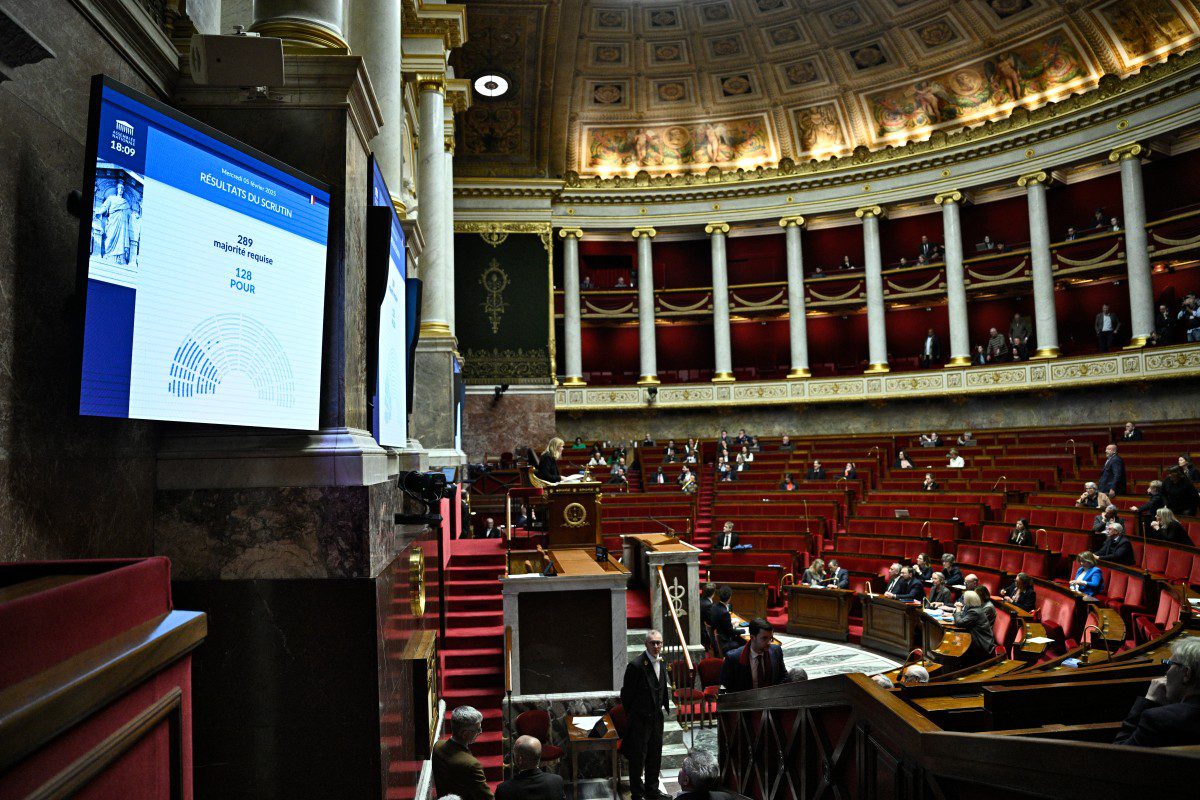
The results displayed on a screen after a vote on a no-confidence motion against French PM Francois Bayrou on February 5, 2025
Julien De Rosa / AFP
On Wednesday, February 5th, French Prime Minister François Bayrou faced two motions of no confidence put forward by the Left in an attempt to topple him after he used Article 49.3 of the Constitution to pass the new 2025 budget without the backing of MPs. The failure of the motions led to the final adoption of the budget, putting an end to the period of financial uncertainty into which France has been plunged since December. That said, opposition parties on both the Right and the Left are not ruling out new attempts to censure the government in the coming weeks.
Far-left La France Insoumise (LFI), a member of the New Popular Front coalition, proposed two motions of censure. Both failed because—unlike in December, when such a motion led to the fall of the government led by Michel Barnier—this time, neither the Socialist Party (PS) on the Left nor the Rassemblement National (RN) on the Right voted for censure.
The Socialist Party refused to censure the government after negotiating certain points in the budget with the PM and obtaining guarantees—for example, that 4,000 teaching posts initially slated to be cut would remain. The party’s allies in the NFP are furious and view the Socialists’ defection as the de facto end of the coalition.
The RN did not censure Bayrou either, believing that not enough was at stake this time: the Socialists’ decision guaranteed that the censure would fail anyway.
“I believe that, with Marine Le Pen, I have made a responsible choice,” explained RN president Jordan Bardella, saying he did not think the French would have benefited from “the fall of a Macronist government that would be replaced by another Macronist government and that would postpone the budget decision for several weeks.”
For the RN, the priority now is to look ahead to the next legislative elections, which they believe are bound to come this summer, following another dissolution—the only way out of the stalemate into which the country has been plunged. “Stability” is needed “until new elections can be called”—i.e., one year after the June 2024 dissolution—stressed RN vice-president Sébastien Chenu. The party is already preparing for this by selecting its future candidates.
The PS has no intention of giving François Bayrou a blank cheque and is preparing its revenge. The Socialists have announced their intention to propose a motion of censure against the government after the budget vote—to condemn Bayrou’s comments on “migratory submersion.” This is a ‘spontaneous motion of censure’ under Article 49.2, which can be used for any reason, unlike Article 49.3, which is typically used when a law is pushed through by force. Using Article 49.2, the PS wishes to punish “the right-wing atmosphere of the government” with a “symbolic and political motion.”
This prospect is of considerable concern to the government, as spontaneous censure on such a subject seems easier to obtain. The PS could very well gather a sufficient majority of MPs ready to condemn Bayrou’s comments on immigration, which were met with strong disapproval on the left and in the centre, including by some Macronists. It was this procedure that, in 1962, led to the fall of Prime Minister Georges Pompidou, the first in the Fifth Republic to be toppled before Michel Barnier. In any case, the Socialist Party’s manoeuvre proves the extent to which the subject of immigration is turning into an ideological obsession on the Left and paralyzing the country.
The government is taking the risk very seriously and put the response to this possible censure on the agenda for their discussions on Tuesday, January 4th. They fear that the RN will join the movement just to bring down the government, but there is nothing obvious about such a choice: voting to condemn the words of a prime minister who, for the first time, finally acknowledges the flood of migrants into France would be difficult to justify to Marine Le Pen voters. “They’re doing it about migratory submersion, so I think it’s going to be complicated for us. Unless we want to pull a stunt and bring down the government at all costs,” analysed an RN MP interviewed by BFM TV.
For the time being, the budget proposed by Bayrou has been adopted. It now needs a confirmation vote in the Senate, where it is already guaranteed to pass. The prime minister emerged victorious from the ordeal, forging a reputation as a skilful negotiator. The reform of France, however, will have to wait—as the budget pushed through does not solve any of the country’s fundamental problems.
